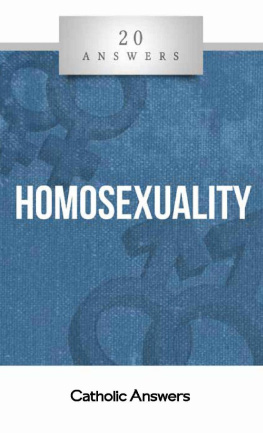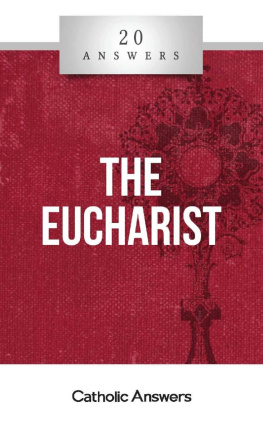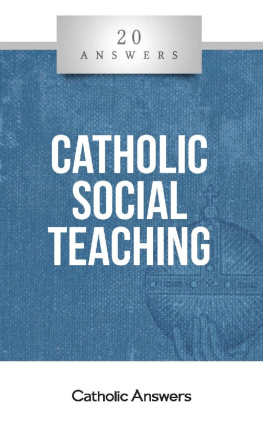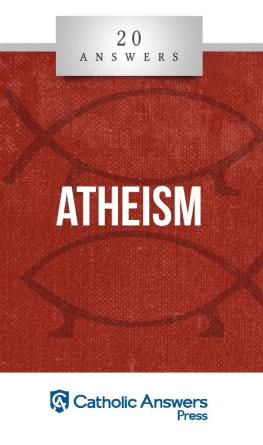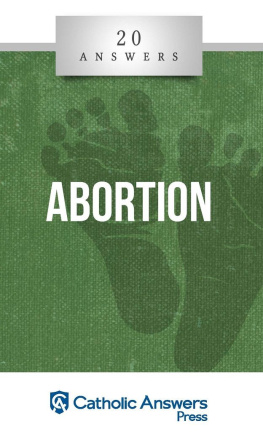Hugh Barbour O. Praem - 20 Answers: Prayer (20 Answers Series from Catholic Answers Book 38)
Here you can read online Hugh Barbour O. Praem - 20 Answers: Prayer (20 Answers Series from Catholic Answers Book 38) full text of the book (entire story) in english for free. Download pdf and epub, get meaning, cover and reviews about this ebook. year: 2020, publisher: Catholic Answers Press, genre: Religion. Description of the work, (preface) as well as reviews are available. Best literature library LitArk.com created for fans of good reading and offers a wide selection of genres:
Romance novel
Science fiction
Adventure
Detective
Science
History
Home and family
Prose
Art
Politics
Computer
Non-fiction
Religion
Business
Children
Humor
Choose a favorite category and find really read worthwhile books. Enjoy immersion in the world of imagination, feel the emotions of the characters or learn something new for yourself, make an fascinating discovery.

- Book:20 Answers: Prayer (20 Answers Series from Catholic Answers Book 38)
- Author:
- Publisher:Catholic Answers Press
- Genre:
- Year:2020
- Rating:3 / 5
- Favourites:Add to favourites
- Your mark:
- 60
- 1
- 2
- 3
- 4
- 5
20 Answers: Prayer (20 Answers Series from Catholic Answers Book 38): summary, description and annotation
We offer to read an annotation, description, summary or preface (depends on what the author of the book "20 Answers: Prayer (20 Answers Series from Catholic Answers Book 38)" wrote himself). If you haven't found the necessary information about the book — write in the comments, we will try to find it.
20 Answers: Prayer (20 Answers Series from Catholic Answers Book 38) — read online for free the complete book (whole text) full work
Below is the text of the book, divided by pages. System saving the place of the last page read, allows you to conveniently read the book "20 Answers: Prayer (20 Answers Series from Catholic Answers Book 38)" online for free, without having to search again every time where you left off. Put a bookmark, and you can go to the page where you finished reading at any time.
Font size:
Interval:
Bookmark:

20 Answers
g
Prayer
Hugh Barbour, O. Praem.
&
Sebastian Walshe, O. Praem.

20 Answers: Prayer
Hugh Barbour, O. Praem.
Sebastian Walshe, O. Praem.
2019 Catholic Answers
All rights reserved. Except for quotations, no part of this book may be reproduced or transmitted in any form or by any means, electronic or mechanical, including photocopying, recording, uploading to the internet, or by any information storage and retrieval system, without written permission from the publisher.
Published by Catholic Answers, Inc.
2020 Gillespie Way
El Cajon, California 92020
1-888-291-8000 orders
619-387-0042 fax
Printed in the United States of America
978-1-68357-156-8
978-1-68357-157-5 Kindle
978-1-68357-158-2 ePub
Introduction
There is saying one sometimes sees on posters or bumper stickers: Prayer Is the Answer. Well, we can hope that in offering twenty answers on the subject of prayer, this little volume will be especially profitable to the inquiring Christian soul.
There is no other activity more powerful and valuable than prayer. There is no better use of our mind and will, of our imagination, memory, and affections, and even of our bodies, than prayer. St. Alphonsus Ligouri calls prayer the great means of salvation and he goes on to say that he who prays is saved.
There is nothing more important than our eternal salvation. Our salvation is due to our union with Christ and his holy ones, and prayer achieves this union.
This little book is not filled with quotations and learned references; it is written straightforwardly and simply. Learning about prayer is really the work of a lifetime, and as we grow in the practice of prayer we are continually learning more and more. This work is just to begin or to fill in some gaps or to inspire or renew your life of prayer. That life is as vast and deep as is the love of God, who draws us to him in prayer by his great care and mercy.
The tradition of prayer from which we will draw is predominantly that of the Latin rite of the Catholic Church, though much could be said along the same lines making use of the Eastern Christian traditions as well. It is hoped that these answers will be helpful to all Christians of whatever tradition, as the life of prayer is essentially one since it seeks union with the one God.
We pray that the Blessed Mother of God, and our Mother, will be with us to make us feel most deeply what she can teach us best, namely, that prayer is indeed the answer.
1.What is prayer?
We may say most simply that prayer is asking for things from God or the angels and saints that we cannot get on our own. It is also for this reason an awareness of who they are in relation to us: a climbing up, as it were, to them, an ascent, a going-up in hope. This going-up to God and his holy ones is the expression of our will, our desire to possess the good things they alone can obtain for us. This desire, which is the basis of prayer, proceeds from the depths of our hearts where God dwells present even more deeply than we are present to ourselves.
In prayer, then, to ascend means not only to rise higher, but also to go more deeply within.
You may notice that this description of prayer includes every way of praying possible, from the first recited prayers of little toddlers to the contemplative rapture of the mystic andfor most of usthe busy, burdened practice of prayer in the midst of our duties as well as our prayers in common together in the worship of the Church. Prayer is both brief and prolonged, public and private, vocal and mental.
When we say things that we cannot get on our own, we mean that they are really beyond our powers or our reach. Prayer expresses our real dependence on God and the saints. We have many things that with our human abilities we have learned to do on our own; for these we do not need to pray. (Except perhaps in thanksgiving, since we know we can never adequately thank our good Lord for all he has given to us!)
Happiness in this life and the next is perhaps the first thing for which we pray, since none of us can make himself happy on his own without God. Thus, when we ask for things that are mostly in our power, things we could buy or earn, we ask for them in prayer because we want them only if they can be a means to what we cannot have by ourselves: happiness , grace , holiness , eternal life . Thus we only pray on the condition that what we desire is pleasing to God and our heavenly friends on whom we depend.
But even more than happiness, there is a second common motive for prayer: to seek Gods mercy in pardoning our sins and healing us from their accumulated (or accumulating!) effects in and around us. Because prayer for mercy expresses in the deepest form a need we cannot fulfill, it is the prayer that is most certainly heard as soon as it is offered. Happiness may come later, very much later perhaps, but mercy is a quality so proper to God that he bestows it at once when we pray going up to him with a contrite heart. We have a great and mysterious bargain here: nothing is more displeasing to God and more unlike prayer than sin, and nothing is more pleasing to God than when we ask him in prayer to forgive our sin.
After our own happiness and pardon, we pray for those who are dear to us, of course, and our enemies (those who may have hurt us or whom we dislike or resent), that all may have the happiness and forgiveness we desire for ourselves.
As you may have noticed, prayer is not exactly meditation or contemplation of heavenly things; meditation readies us and disposes us to pray and increases our desire for the happy-making union with these realities, but prayer is the causal force that obtains what we desire. It is a way of making the best things happen to us and to others because we are one with the One who is good and all-powerful and who can do for us what we cannot do for ourselves.
2.What are the kinds of prayer?
Normally we ask for things in words. Prayer is no different. We must never look down on simple vocal prayers, no matter how common or simple or rote. If in prayer we happen to stop speaking in words, it is still a conversation of the heart, like the silent presence of two friends to each other, but we must remember that they got to where they are first of all by speaking. Thus we say our morning prayers, and our rosary, our Divine Office; and, for priests, our Mass. We should never be snobs about vocal prayer!
Yet when we speak in words truthfully, we mean what we say. Meaning what we say is the essence of what we call mental prayer , which is the necessary participation of our inner mind and will in what we are saying in prayer.
Now obviously, the meaning part of prayer is more essential than the more basic verbal or vocal part. When the meaning begins to predominate over the precise words used in prayer, then we have embarked on the journey of mental prayer. Our heart is attending to the presence of God and his mysteries, which our words cannot adequately express. Yet we are still asking, pleading for a greater share of these marvels that surpass our powers of speech or action.
Usually, prayer in which the hearts thought of the meaning predominates is called meditation or contemplation , and usually, but not always, this mental prayer follows on our vocal prayer, and usually ends with it as it gently concludes its time with the Lord. In the matter of mental prayer, the one praying and God and the saints act with great freedom, adapting the prayer to the character of each. This is what we do in all conversation with those whom we love. We should not draw up a diagram of how it all works and try to follow it. We simply speak to and attend to the God whom we love, and many good things follow!
Font size:
Interval:
Bookmark:
Similar books «20 Answers: Prayer (20 Answers Series from Catholic Answers Book 38)»
Look at similar books to 20 Answers: Prayer (20 Answers Series from Catholic Answers Book 38). We have selected literature similar in name and meaning in the hope of providing readers with more options to find new, interesting, not yet read works.
Discussion, reviews of the book 20 Answers: Prayer (20 Answers Series from Catholic Answers Book 38) and just readers' own opinions. Leave your comments, write what you think about the work, its meaning or the main characters. Specify what exactly you liked and what you didn't like, and why you think so.


